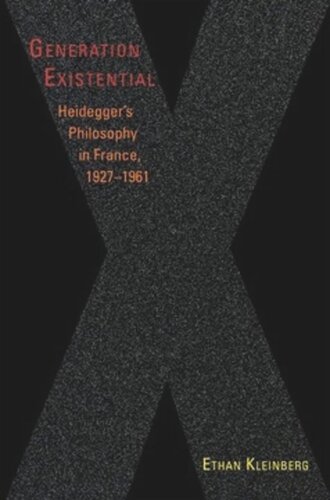

Most ebook files are in PDF format, so you can easily read them using various software such as Foxit Reader or directly on the Google Chrome browser.
Some ebook files are released by publishers in other formats such as .awz, .mobi, .epub, .fb2, etc. You may need to install specific software to read these formats on mobile/PC, such as Calibre.
Please read the tutorial at this link: https://ebookbell.com/faq
We offer FREE conversion to the popular formats you request; however, this may take some time. Therefore, right after payment, please email us, and we will try to provide the service as quickly as possible.
For some exceptional file formats or broken links (if any), please refrain from opening any disputes. Instead, email us first, and we will try to assist within a maximum of 6 hours.
EbookBell Team

4.8
34 reviewsWhen we think of Heidegger's influence in France, we tend to focus on such contemporary thinkers as Jacques Derrida, Michel Foucault, and Jean-François Lyotard. In Generation Existential, Ethan Kleinberg shifts the focus to the initial reception of Heidegger's philosophy in France by those who first encountered it. Kleinberg explains the appeal of Heidegger's philosophy to French thinkers, as well as the ways they incorporated and expanded on it in their own work through the interwar, Second World War, and early postwar periods. In so doing, Kleinberg offers new insights into intellectual figures whose influence on modern French philosophy has been enormous, including some whose thought remains under-explored outside France.
Among Kleinberg's "generation existential" are Jean Beaufret, the only member of the group whom one could characterize as "a Heideggerian"; Maurice Blanchot; Alexandre Kojéve; Emmanuel Levinas; and Jean-Paul Sartre. In showing how each of these figures engaged with Heidegger, Kleinberg helps us to understand how the philosophy of this right-wing thinker had such a profound influence on intellectuals of the left. Furthermore, Kleinberg maintains that our view of Heidegger's influence on contemporary thought is contingent on our comprehension of the ways in which his philosophy was initially understood, translated, and incorporated into the French philosophical canon by this earlier generation.